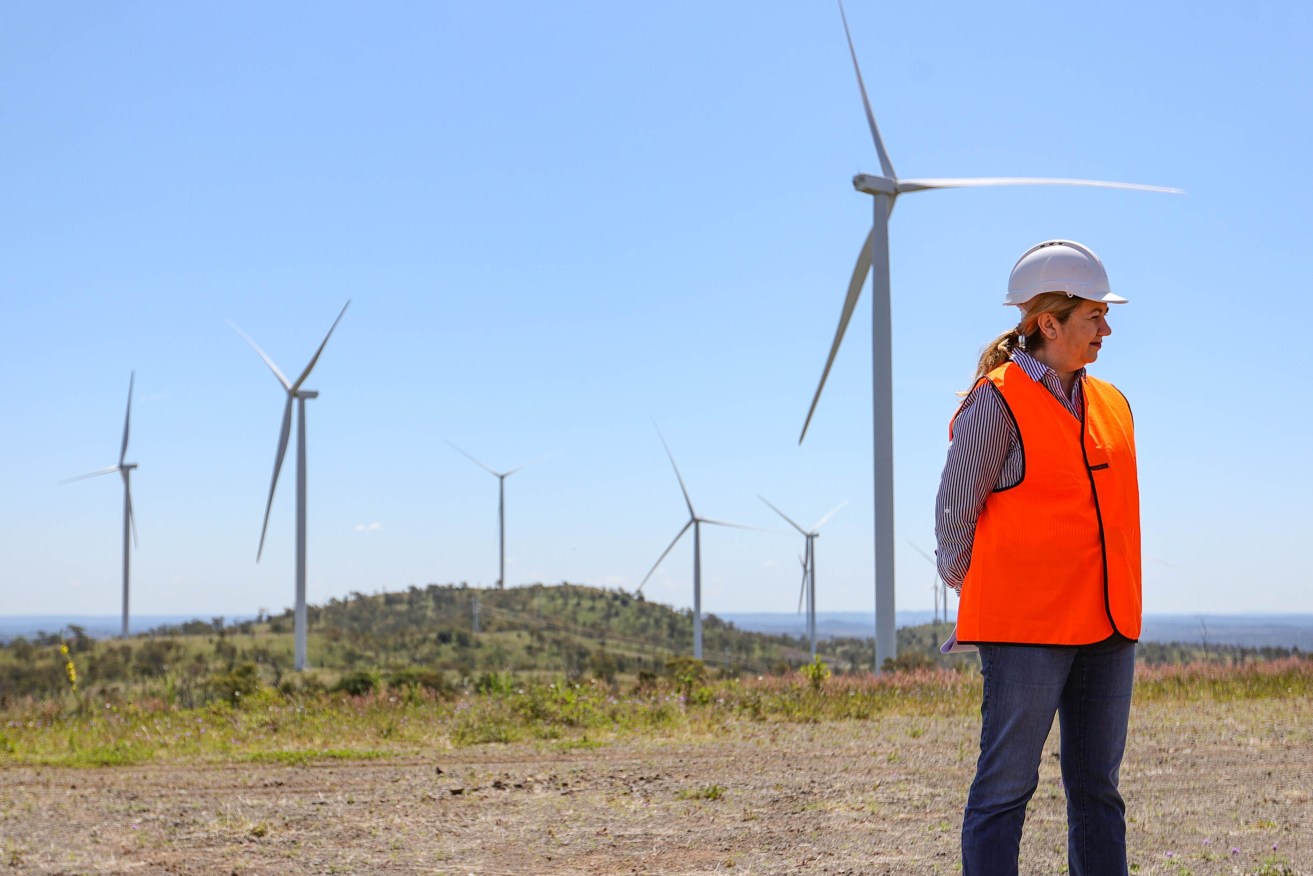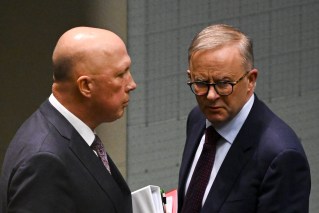Most people say they’d spend their own money to save the planet. Why are Nervous Nellies afraid to do the same?
Is fear about taking action on climate change justified? Dennis Atkins has been looking at a new international study saying the opposite is true.


Former Queensland Premier Annastacia Palaszczuk is seen during a press conference at a wind farm in the South Burnett district of Queensland,. (AAP Image/Russell Freeman)
Around the world there are signs of backlashes against green policies – or so it seems. Should we have a reality check before this becomes a narrative not just embraced and propagated by conservative politicians and their media cheer squad?
History tells us these pieces of conventional wisdom are almost always shallow constructs, designed for political play. There’s no factual basis and the assumptions drawn are equally fanciful.
This hasn’t stopped the brutal outcries many led right now by farmers’s movements.
Big trucks are creating blockades at British Channel ports in the south of England, farmers in France and Italy have choked roads in the centres of the capitals of those countries.
In India farmers are back in the streets protesting deregulation of markets, especially around the sale, pricing and storage of farm produce.
During 2020 Indian farmers squeezed their industry – staging a 12 month strike. Now, in a national election year, they are out again, complaining the fix they were promised hasn’t been delivered. As India’s most critical voting bloc they have a strong hand to play.
In one way or another all these policies and the reactions to them can be traced to climate change.
Governments know they have to take often economy-wide measures, many of which are unpopular. Voters know they can hit back where it hurts – the ballot box.
In the Netherlands an election late last year failed to deliver a clear outcome despite right wing, anti-Muslim populist Geert Wilders leading the party with the greatest support.
Three months after the vote no one has been able to put together a coalition. This is not unusual in the Netherlands – the last government, in 2021, wasn’t formed for 299 days after votes were cast.
If it isn’t a mess, it’ll do until one comes along, as Cormac McCarthy said in No Country For Old Men.
In Australia there is apparent and emerging hysteria about green policies – starting with the intrusion of solar farms, “filthy” wind turbines on land and off-shore. Farmers are meeting in frightened communities and rallying outside Parliament with Barnaby Joyce declaring war on “reckless” renewables.
More recently, new motor vehicle fuel efficiency standards are being called out as the death knell for the great weekend recreational transport mode of choice and tradies’ s favourite, the 4×4 twin cab, utility truck with enough grunt to carry 1 tonne and reach 180kph.
Much of the populist opposition to all these policies, around the world and here in Australia, is based on the kind of scare tactics that killed off Kevin Rudd’s carbon pollution reduction scheme and Julia Gillard’s equally ambitious carbon policing mechanism.
They worked but that was at least a decade ago – 10 years of graphic climate extremes. Wildfires, droughts, floods, devastating storms and the now annual breaking of all previous weather records. “Extreme” is now the go-to word for the weather just as it used to be “sunny”, “showers” or “cloudy periods”.
A microcosm of this thesis might be tested at the Dunkley by-election on March 2 in Melbourne’s exurban, south east. It might, of course, not matter a jot but Coalition leader Peter Dutton is wishing and praying otherwise.
He’s banging his populist snare drums of political war through the shopping centres and halls of Frankston, Cranbourne and Langwarrin. Joyce was at his side until he slipped from a planter box. He might be confined to barracks.
While the Dunkley by-election might give us some information about how people view these policy changes, there is a new study which shows there is a far greater level of public support for action on climate change and a willingness to make a personal sacrifice.
The peer-reviewed study, undertaken by economists around the world and published this month in the journal Nature Climate Change, has been rightly called “striking” by The Financial Times in London which first drew the findings to a wider audience.
The study, conducted late last year across 125 countries and based on 130,000 interviews, makes some truly startling findings.
One percentage point fewer than seven in 10 people said they were willing to contribute 1 percent of their household income every month to pay for climate action.
Those endorsing pro-climate change social norms (in community belief) totalled 86 percent of respondents while 89 percent demanded more intense climate action.
There was also a correlation between demand for action and direct experience with the study authors concluding that “countries facing heightened vulnerability to climate change show a particularly high willingness to contribute”.
This was all the more revealing as these countries were often in the lower deciles of per capita wealth.
The study underscores why politicians should step back from wariness towards climate action: there is much more support than you think – in fact there’s more backing for action than the people think.
While seven in 10 people are willing to open their wallets when asked how many they think would join them it’s just slightly more than four in 10. This represents a misconception driving low expectations.
Meanwhile, overall results are encouraging for people supporting strong, more immediate climate action. ”About two-thirds of the global population report being willing to incur a personal cost to fight climate change, and the overwhelming majority demands political action and supports pro-climate norms,” says the study. ”This indicates that the world is united in its normative judgment about climate change and the need to act.
The study highlights four aspects of cooperation which interact: the consensus on pro-climate norms should strengthen the willingness to contribute by individuals and the inverse is also probable.
As well, implementing climate policies should strengthen climate norms – the study authors believe there is a strong positive correlation between a willingness to contribute, pro-climate norms, support from policy-makers and broader belief about any willingness to contribute in other countries.
“Our findings can inform system dynamics models and social climate models that explicitly take into account the interaction of human behaviour with natural physical systems,” the study concludes.
The simple final conclusion of this study should be read seriously by our policy makers who have been far too shy about climate action for more than two decades.
“Rather than echoing the concerns of a vocal minority that opposes any form of climate action, we need to effectively communicate that the vast majority of people around the world are willing to act against climate change and expect their national government to act,” say the authors.
Over to you Prime Minister Albanese.












